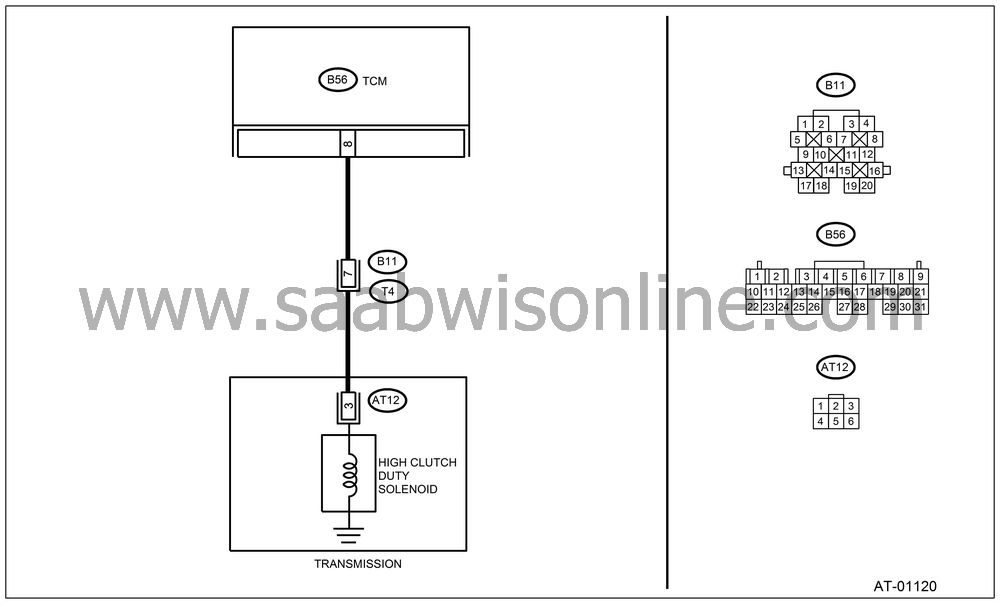DTC P0763 SHIFT SOLENOID “C” ELECTRICAL
| DTC P0763 SHIFT SOLENOID “C” ELECTRICAL |
DIAGNOSIS:
The output signal circuit of high clutch duty solenoid is open or shorted.
TROUBLE SYMPTOM:
Excessive shift shock.
WIRING DIAGRAM:

CHECK HARNESS CONNECTOR BETWEEN TCM AND TRANSMISSION.
Turn the ignition switch to OFF.Disconnect the connector from TCM and transmission.
Measure the resistance of harness between TCM and transmission connector.
Connector & terminal
(B56) No. 8 — (B11) No. 7:
Is the resistance less than 1 Ω?
| Yes |
| No |
Repair the open circuit in harness between TCM and transmission connector.
CHECK HARNESS CONNECTOR BETWEEN TCM AND TRANSMISSION.
Measure the resistance of harness connector between TCM and chassis ground.Connector & terminal
(B56) No. 8 — Chassis ground:
Is the resistance more than 1 MΩ?
| Yes |
| No |
Repair the short circuit in harness between TCM and transmission connector.
CHECK HIGH CLUTCH DUTY SOLENOID.
Measure the resistance between transmission connector receptacle’s terminals.Connector & terminal
(T4) No. 7 — No. 20:
Is the resistance 2.0 — 6.0 Ω?
| Yes |
| No |
CHECK OUTPUT SIGNAL FROM TCM USING Vehicle Diagnostic Interface.
Connect the connectors to TCM and transmission.Lift-up the vehicle and place rigid racks.
| Note | ||
|
Raise all wheels off ground. |
Connect the Vehicle Diagnostic Interface to data link connector.
Start the engine and turn Vehicle Diagnostic Interface switch to ON.
Start the engine and warm-up the transmission until ATF temperature is above 80°C (176°F).
| Note | ||
|
If ambient temperature is below 0°C (32°F), drive the vehicle until ATF reaches its operating temperature. |
Read the data of high clutch duty solenoid using Vehicle Diagnostic Interface.
| • |
High clutch
duty solenoid is indicated in “%”.
|
|
Move the select lever to “D” range and slowly increase vehicle speed and measure at 3rd or 4th gear.
Is the value 0%?
| Yes |
| No |
CHECK OUTPUT SIGNAL FROM TCM USING Vehicle Diagnostic Interface.
Return the engine to idling speed and move select lever to “N” range.Is the value 100%?
| Yes |
Even if the POWER indicator blinks, the circuit has returned to a normal condition at this time. A temporary poor contact of the connector or harness may be the cause. Repair the harness or connector in TCM and transmission.
| No |
CHECK POOR CONTACT.
Is there poor contact in high clutch duty circuit?
| Yes |
Repair poor contact.
| No |
CHECK HIGH CLUTCH DUTY SOLENOID (IN TRANSMISSION).
Remove the transmission connector from bracket.Drain the ATF.
| Important | ||
|
Do not drain the ATF until it cools down. |
||
Remove the oil pan and disconnect connector from high clutch duty solenoid.
Measure the resistance between high clutch duty solenoid connector and transmission ground.
Connector & terminal
(AT12) No. 3 — Transmission ground:
Is the resistance 2.0 — 6.0 Ω?
| Yes |
| No |
Replace the control valve body.

CHECK HARNESS CONNECTOR BETWEEN HIGH CLUTCH DUTY SOLENOID AND TRANSMISSION.
Measure the resistance of harness between high clutch duty solenoid and transmission connector.Connector & terminal
(T4) No. 7 — (AT12) No. 3:
Is the resistance less than 1 Ω?
| Yes |
| No |
Repair the open circuit in harness between TCM and transmission connector.
CHECK HARNESS CONNECTOR BETWEEN HIGH CLUTCH DUTY SOLENOID AND TRANSMISSION.
Measure the resistance of harness between transmission connector and transmission ground.Connector & terminal
(T4) No. 7 — Transmission ground:
Is the resistance more than 1 MΩ?
| Yes |
Even if the POWER indicator blinks, the circuit has returned to a normal condition at this time. A temporary poor contact of the connector or harness may be the cause. Repair the harness or connector in high clutch duty solenoid and transmission.
| No |
Repair the short circuit in harness between high clutch duty solenoid and transmission connector.


